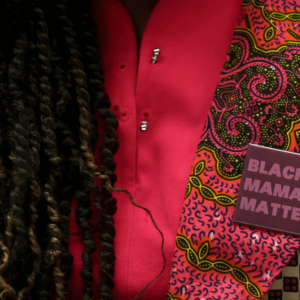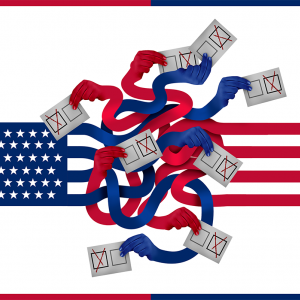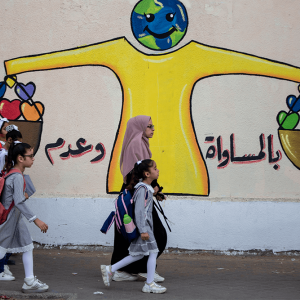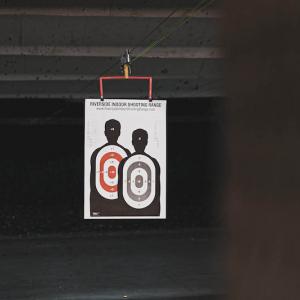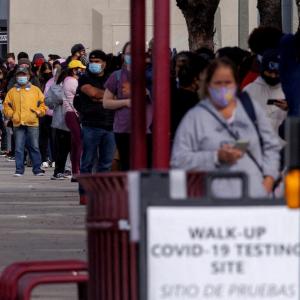
As a former political director at Sojourners, Lauren W. Reliford, MSW, was responsible for developing and implementing Sojourners’ policy strategy, positioning, framing, messaging, and advocacy for outreach and impact on Capitol Hill and the presidential administration. She is a passionate and mission-oriented public and population health professional focused on bridging the gap between social theory, spirituality, research, and practice to the forefront of our major policy decisions.
Lauren joined Sojourners with over 10 years of experience in research, policy, advocacy, and government relations. Prior to joining Sojourners, Lauren took her passion for politics and policy and turned it into a profession, focusing on domestic and international public health advocacy for of a number of large nonprofit organizations. She also earned her master’s degree in social work and focused primarily on the biological impacts of trauma in high-risk and vulnerable populations. She credits her time doing frontline social work during the pandemic as a turning point in her life and career and was drawn to Sojourners because it would allow her to continue the good work and act on her morals and values at a policy level.
She is a native of the Washington, D.C., metro area and earned her B.A. in political science from Boston College and her MSW in social policy-clinical social work at the National Catholic School of Social Services at the Catholic University of America. Lauren is an avid reader, loves her Washington Football Team, and spends time with her two dachshunds, Walter and Riley, when she needs a break.
Posts By This Author
Who Would Jesus Cut From Medicaid?
For me, this faith has always been rooted in Jesus’ lived example of how we are to be unapologetic in our support for each other. And when Jesus says, “love thy neighbor as thyself,” I imagined this meant, well, help thy neighbor, assist thy neighbor, care for thy neighbor, nurture thy neighbor — all without condition or justification, just as Jesus did. But since then, I’ve learned a serious lesson about the limitations of the Christian imagination in politics. Despite our shared faith, many lawmakers in this country don’t seem to envision a country where we actually put these values into practice. My latest disappointment? Millions of people losing Medicaid coverage — our nation’s primary public health system that provides health care and support for folks with low income and/or disabilities — because states refuse to do the right thing.
A Biblical Perspective on the Debt Ceiling Debate
As lawmakers on Capitol Hill argue about the national debt, the Bible verse that’s been on my mind is Proverbs 3:27: “Do not withhold good from those to whom it is due, when it is in your power to act.”
If Christians Want to ‘Choose Life,’ Let’s Talk About Black Maternal Mortality
Our country is rolling back reproductive health access in the name of “choosing life” while refusing to support life’s development in utero and post-birth. We also have not ensured that people who give birth or care for children have paid family and medical leave, workplace protections, or even access to health care facilities. In states like Mississippi and Alabama, budget pressures are forcing many rural hospitals to close, cutting off the only point of care before, during, and after labor.
The Liberating Theology That Transformed My Understanding of God
“You’ve never heard of womanist theology?!” My colleague Rev. Moya Harris looked at me with a mix of excitement and incredulity. This wasn’t unusual: Through I attended parochial schools and Catholic colleges, I’m a relative newbie to the wider world of faith-based organizations and advocacy — and thus my work frequently involves googling the names of theologians, denominations, and Christian leaders I’ve never heard of before. I love this environment of continued learning, but when I learned about womanist theology, I realized I had been missing a key element of my faith: the liberatory and healing nature of God.
Biden’s State of the Union Reminded Me of a Homily
“Christmas for policy wonks.” “The political Super Bowl.” “A very boring speech.” Three different descriptions for one of the biggest nights in politics: the annual State of the Union. Here in Washington, D.C, we politicos have been known to create bingo cards or gather in bars to watch an address that will have major implications for the work we do.
The Fringe Legal Theory That Could Manipulate Our Elections
JUST AS FOR 50 years Ohio was a bellwether for presidential elections, since 2011 North Carolina has become a testing ground for Far Right legislation aimed at controlling federal election administration. In his book Indecent Assembly, author Gene R. Nichol says North Carolina is now “a laboratory for extremism.”
In September, the Supreme Court included on its docket a Republican-backed case out of North Carolina that pits voters against a state legislature that seeks to greatly increase its power over elections by limiting the ability of the state judiciary to review the actions of the legislature. This could potentially unbalance the fundamental checks and balances essential to a functioning democracy by giving one body total control over a function of government.
While the specific case of Moore v. Harper deals with whether the North Carolina state Supreme Court has the power to strike down state legislation that produced illegally gerrymandered voting districts, the federal Supreme Court will deliberate on whether the U.S. Constitution’s election clause, the primary source of constitutional authority to regulate elections, prevents a state judiciary from ordering a state legislature to comply with federal election laws.
Bear One Another’s Burdens, Prevent Suicide
If you or a loved one have been impacted by suicide or self-harm, there is nothing to be ashamed of. Scripture teaches us that when one person suffers, we all suffer. Yet if you are in a place of active suicidal ideation, or having self-harming thoughts, it can feel like you have been completely swallowed by the dark; it’s a lonely and terrifying place. But here is the truth: You are wanted on this earth.
Beyond the Bad News Headlines of the Holy Land
I was amazed at the grassroots leaders, mainly women, working to deliver that desperately needed good news to their communities. Their witness was particularly poignant given the patriarchal context in which they worked. Many of the government officials we met with were men who seemed focused on who would get what in the region’s future; the women we met were empowering people in their communities to create change.
I'm Seeking a Handgun License. I Still Support Gun Reform
As a Black woman, I’ve always known that my skin color could get me killed. As I watched Capitol rioters carry the Confederate flag through the Capitol on Jan. 6, I knew the danger was more present than ever. In the wake of the Jan. 6 insurrection, the increase in white nationalist terrorism made me realize that I needed to take drastic measures to ensure my safety.
That Helplessness You're Feeling Is a Trauma Response
In January 2020, COVID-19 was first detected in United States. In the two years since, we’ve experienced death and mourning on a massive scale, lost relationships over politically driven misinformation about the deadly virus, and felt constant fear and anxiety as we try to protect ourselves and our loved ones. This trauma has shaken many to their spiritual core in ways that will leave lasting effects. As the omicron variant rips through communities, I’ve heard many people express feelings of resignation. Helplessness. Hopelessness. And given how trauma works, we shouldn't be surprised when notice ourselves experiencing these feelings, even in our churches.
For Today’s Moms, There's Still No Room at the Inn
The season of Advent holds a special meaning for me because it reminds me of the power of a mother’s love. While I know “Jesus is the reason for the season,” I cannot help but shift my attention to the woman who brought him into the world — and what she had to endure to birth him.
The Parable of the Federal Budget
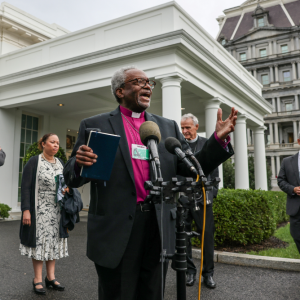
Bishop Michael Curry, the presiding bishop of the Episcopal Church, speaks to the media on Sept., 22, 2021, following a meeting between a coalition of Christian denominations and the White House to discuss investments in anti-poverty initiatives and programs that support children and families. REUTERS/Evelyn Hockstein
We've long argued that budgets — including our federal budgets — are moral documents. As Christians, we see this as a principle deeply rooted in scripture, including Luke's gospel, which explains that the two greatest commandments are to love God and love our neighbors (Luke 10:27). In that same passage, Jesus tells the parable of the Good Samaritan, a story about how our love for God and neighbor will be tested when our neighbors need us the most.


